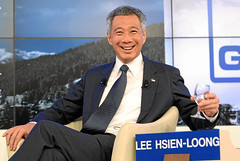ASEAN
22 March 2014
Singapore wants US to stay in Asia
In a fascinating interview, Singapore Prime Minister LEE Hsien Loong said "We think that it is good that the US presence remains in the region, including the security presence".
In a fascinating interview in The Australian newspaper of 29-30 September, Singapore Prime Minister LEE Hsien Loong said "We think that it is good that the US presence remains in the region, including the security presence".
He unambiguously supports President Obama's "pivot" to Asia, even if America never left the region. The US has many friends and interests in the region. The US doesn't have a base in Singapore, but they visit frequently and there's a logistics support unit for the navy ships. LEE strongly supports the Australian government policy of rotating 2500 US marines through Darwin each year.
The US/China relationship will always be a co-operative as well as competitive relationship, with both frictions as well as areas of convergence. Once US and Chinese leaders are elected, they don't want to pursue a path of confrontation, whatever might be said during presidential elections. But some issues are difficult to reconcile, like the Chinese exchange rate. (Singapore has excellent relations with both the US and China.)
The biggest challenge in Asia is to rebalance strategically in a way that gives the Chinese more space without unsettling things and destabilizing longstanding, gradually built-up relationships. China is having a bigger role trade-wise, economics-wise and in terms of influence in the region. The shift is more an economic and political one, rather than a military one. Other countries continue to welcome the US presence.
LEE is worried about the confrontations between China and other countries in the East and South-East China Sea. These tensions arise from the belief that there are hydrocarbons in the area, as well as nationalistic pressures. There is a competition between the Mayor of Tokyo and the national government for guarding the national interest. And in China, the people have been educated (indoctrinated?) about the Sino-Japanese war and China's sufferings at the hands of the Japanese. And the new generation of Chinese have grown up in a period of China's rapid emergence and growing self-confidence. There is always the risk of a mishap at sea, with lives being lost, which could escalate.
At its last ministerial meeting in Cambodia in June, ASEAN was unable to issue a joint statement, reportedly because Beijing had influenced the Cambodian government as host and chair to reject any reference to recent skirmishes at sea, which The Philippines and Vietnam wanted included. According to LEE, this was a "setback", it was "no good", and "it cast doubt on our effectiveness".
LEE Hsien Loong, like his father LEE Kuan Yew, is a very wise and thoughtful man. It is to be hoped that he might impart some of that wisdom to his Australian friends on his upcoming visit down-under.
Executive Director
Asian Century Institute
www.asiancenturyinstitute.com
He unambiguously supports President Obama's "pivot" to Asia, even if America never left the region. The US has many friends and interests in the region. The US doesn't have a base in Singapore, but they visit frequently and there's a logistics support unit for the navy ships. LEE strongly supports the Australian government policy of rotating 2500 US marines through Darwin each year.
The US/China relationship will always be a co-operative as well as competitive relationship, with both frictions as well as areas of convergence. Once US and Chinese leaders are elected, they don't want to pursue a path of confrontation, whatever might be said during presidential elections. But some issues are difficult to reconcile, like the Chinese exchange rate. (Singapore has excellent relations with both the US and China.)
The biggest challenge in Asia is to rebalance strategically in a way that gives the Chinese more space without unsettling things and destabilizing longstanding, gradually built-up relationships. China is having a bigger role trade-wise, economics-wise and in terms of influence in the region. The shift is more an economic and political one, rather than a military one. Other countries continue to welcome the US presence.
LEE is worried about the confrontations between China and other countries in the East and South-East China Sea. These tensions arise from the belief that there are hydrocarbons in the area, as well as nationalistic pressures. There is a competition between the Mayor of Tokyo and the national government for guarding the national interest. And in China, the people have been educated (indoctrinated?) about the Sino-Japanese war and China's sufferings at the hands of the Japanese. And the new generation of Chinese have grown up in a period of China's rapid emergence and growing self-confidence. There is always the risk of a mishap at sea, with lives being lost, which could escalate.
At its last ministerial meeting in Cambodia in June, ASEAN was unable to issue a joint statement, reportedly because Beijing had influenced the Cambodian government as host and chair to reject any reference to recent skirmishes at sea, which The Philippines and Vietnam wanted included. According to LEE, this was a "setback", it was "no good", and "it cast doubt on our effectiveness".
LEE Hsien Loong, like his father LEE Kuan Yew, is a very wise and thoughtful man. It is to be hoped that he might impart some of that wisdom to his Australian friends on his upcoming visit down-under.
Author
John WestExecutive Director
Asian Century Institute
www.asiancenturyinstitute.com




